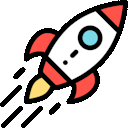Skip to content
Definition of Lean StartupFundamental PrinciplesHistory and origins of the concept
Attributes of a Successful EntrepreneurDeveloping an Entrepreneurial MindsetResilience and Adaptability
Introduction to the Business Model CanvasUnderstanding the 9 Blocks of the CanvasPractical Exercise: Creating a Business Model Canvas
Identifying the Problem to SolveTechniques for Validating the ProblemPractical Exercise: Problem Validation
What is an MVP?Why is it Important for a Lean StartupPractical Exercise: Designing an MVP
Introduction to the Build-Measure-Learn CycleHow to Implement the Cycle in a Lean StartupPractical Exercise: Application of the Build-Measure-Learn Cycle
Introduction to Growth HackingDigital Marketing ToolsCreating an Effective Marketing Strategy
Fundamentals of Data Analysis and Data Analysis ToolsKey Metrics and KPIs, Data VisualizationPrinciples of A/B Testing and Techniques for Optimising Conversions
Techniques to Stimulate InnovationCreating an Innovative Work EnvironmentPractical Exercise: Generation of Innovative Ideas
Financial Planning and Identifying Key Financial MetricsThe Importance of Networking and Techniques for Building NetworksTypes of Funding and How to Attract Investors
Risk Identification, Risk Mitigation and Contingency PlanningSuccess Factors for Scalability and Growth StrategiesFundamentals of Corporate LawIntellectual Property Protection (patents, trademarks, copyright)
How to prepare an effective pitchPresentation strategies and storytellingBuilding a persuasive argument for your product/service.
Identification of the problem that your startup aims to solve. Brainstorming and discussion.Problem definition. Synthesis and clear formulation of the problem that your startup intends to solve.
Introduction to the Business Model Canvas. Brainstorming on the first five blocks of the canvas (customer segments, value proposition, channels, customer relationships, revenue streams).Discussion and definition of the first five blocks of the Canvas.Brainstorming on the remaining four blocks of the Canvas (key resources, key activities, key partnerships, cost structure).Discussion and definition of the remaining four blocks of the Canvas.
Brainstorming and discussion on developing an MVP that could solve the identified problem.Initiation of the design of your MVP.
Completion of the design of your MVP. Discussion on planning the Build-Measure-Learn cycle.Implementation of your MVP and initiation of data collection.
Analysis of the data collected from your MVP.Optimisation of your product based on the collected data.
Preparation of the pitch for your startup.Pitch practice and receiving feedback.
Each team presents their pitch to a panel of "investors" (which could be course instructors, other students, etc.).Receiving feedback, reflecting on the process, and identifying the next stages for your startup.


 Lean Startup Accelerator
Lean Startup Accelerator
From Concept to Realisation
Day 1: Introduction to Lean Startup
Day 2: The Entrepreneurial Mindset
Day 3: Business Model Canvas
Day 4: Problem Validation
Day 5: Development of the Minimum Viable Product (MVP)
Day 6: The Build-Measure-Learn Method
Day 7: Marketing Techniques for Lean Startups
Day 8: Analysis, Interpretation of Data, and A/B Testing
Day 9: Lean Startup and Innovation
Day 10: Managing Resources, Network Building:
Day 11: Risk Management, Scalability, and Legal Aspects:
Day 12: Effective presentation and Pitching:
Project Work
DAY 13: Problem Identification and Definition
DAY 14-15: Business Model Canvas Creation
DAY 16: Minimum Viable Product (MVP) Development
DAY 17: MVP Completion and Build-Measure-Learn Cycle Planning
DAY 18: Data Analysis and Optimisation
DAY 19: Pitch Preparation
DAY 20: Presentation and Review
Creare glossario terminologia usata e faq dei micro argomenti
Want to print your doc?
This is not the way.
This is not the way.

Try clicking the ··· in the right corner or using a keyboard shortcut (
CtrlP
) instead.